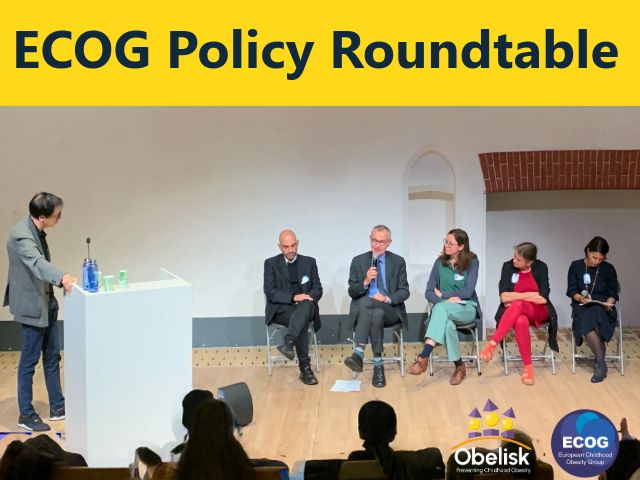
Experts agree on the need for a strong regulatory framework to address childhood obesity
On October 10, the European Childhood Obesity Group (ECOG) hosted a policy roundtable during its 33rd annual congress in Ghent, Belgium as part of a series to be organised in the framework of the European-funded project, Obelisk.
Moderated by Philippe Froguel, Professor and Chair of Genomic Medicine at Imperial College London, Professor of Endocrinology at the University Hospital of Lille, and Co-Coordinator of the Obelisk Project, the roundtable featured an exceptional panel of expert speakers from diverse stakeholder groups across local, regional, national, and European levels of governance, including:
- Frank Vandenbroucke: Belgian Deputy Prime Minister and Minister of Health and Social Affairs.
- Paulo J. Oliveira: Principal Investigator and Vice-President at CNC-UC, Coordinator of EU Project PAS GRAS, and Chair of ObeClust.
- Leen Van Zele: Coordinator of Local Health Policy at the City of Ghent
- An Vandeputte: Director of the Flemish Nutrition & Weight Knowledge Centre EETEXPERT
- Giuseppina Luvarà: Policy Officer at the European Commission, DG Research & Innovation
Prompted by the moderator, the speakers addressed the many challenges to creating effective policies to combat childhood obesity, as well as opportunities to overcome these. Four key takeaways emerged from this discussion:
1. Combatting childhood obesity requires a multidisciplinary, multi-level approach: Stakeholders must go beyond the science and pure health policy, and integrate social, economic, educational, environmental, cultural, and even urban planning dimensions. Action must be coordinated in an interconnected manner across these sectors and across governance levels, including the European, national, regional, and local.
2. The local level is where everything comes together – but local authorities cannot do it on their own. Local authorities know their populations intimately and are best placed to craft and implement initiatives and policies that are tailor-made to work for their constituencies. However, local governance structures often lack the legal mechanisms or tools to do so. It is therefore crucial for national and regional authorities to maintain an open dialogue with them and to create and facilitate access to the mechanisms they need so that they are truly empowered to act on behalf of their populations.
3. Sound and rigorous research is critical to developing effective policies. Scientific evidence is increasingly the basis for the development of health policies and has a key role in identifying, for example, which groups are likely to be impacted by a policy and how effective they may be. As noted by Paulo J. Oliveira, the Chair of ObeClust (the cluster of EU-funded projects aimed at addressing Obesity), scientists in the field must be fully committed to producing sound, rigorous, and accurate research to ensure that evidence-based policies have the best chance of succeeding.
4. A strong regulatory framework is a core component in the fight against childhood obesity. As Belgian Deputy Prime Minister and Minister of Health Frank Vandenbroucke noted, “we cannot just rely on autoregulation" for the problem to be solved. Regulation is needed to make healthier life choices, for example in terms of diet or exercise, more accessible and attractive.
The roundtable underscored the need for a coordinated, multi-sectoral, and evidence-based approach built around a strong regulatory framework to address the growing challenge of childhood obesity. Moving forward, the European Childhood Obesity Group and the Obelisk Project are committed to continuing this dialogue and advocating for more effective policies to prioritise children’s health. The policy roundtable will be back next year at ECOG’s 34th annual congress in Uppsala, Sweden. To learn more about the Obelisk Project and ECOG’s involvement click here.